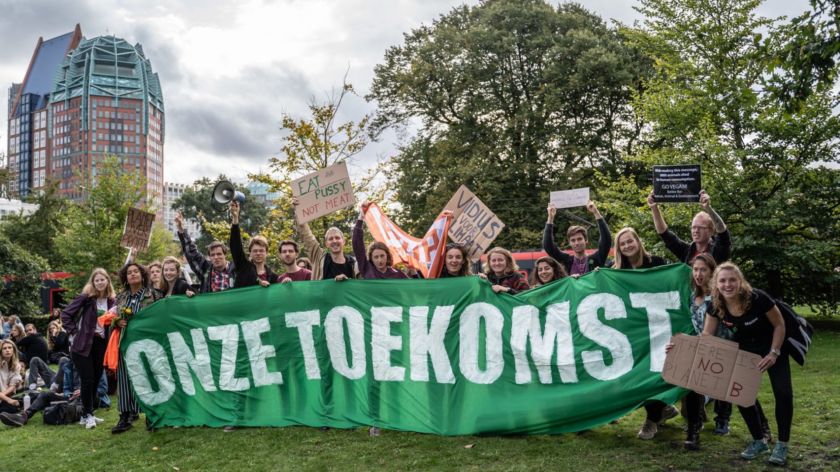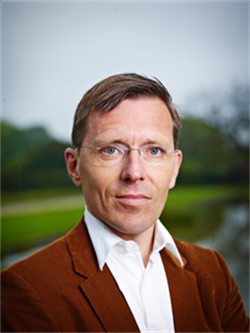The Greta Thunberg generation wants different education: ‘There are big problems headed our way’
-
 Climate march in The Hague in 2019. Photography: Johannes Fiebig
Climate march in The Hague in 2019. Photography: Johannes Fiebig
Students who are now starting university, walk into their lecture halls with the idea that the whole world is on fire. The educational system needs to do something with that, culture scientist Edwin van Meerkerk thinks. In the coming years he is going to investigate how sustainability can have a place in all study programmes at Radboud University.
What if lecturers hear from upstairs that their education needs to be adjusted? ‘Then they close the door on you’, says Van Meerkerk. ‘I know that tendency all too well. Lecturers don’t have time for that.’ And still Van Meerkerk, who teaches arts and culture, hopes to set changes in the field of education in motion in the next few years.
Last year, during Radboud Impact Day, the university announced that from now on, all her students would receive education on sustainability – whether you study environmental science or pedagogics. That was the start of an educational programme that needs to prepare future students for the challenges of the future. But how do you do that?
Planting a seed
The answer to that question is what Van Meerkerk will be searching for. The associate professor in Cultural Studies will start on a project in September, which carries the same name as the most recent slogan of Radboud University: You have a part to play. With a Comenius grant of the Dutch Research Council (NOW) worth around 500.000 euros in his pocket, he will work on integrating sustainability into our education for at least three years. His sights are not set on just his own programme or faculty, but at the entire university.
That leads to lead to tangible and less tangible results. ‘In three years, I want there to be a receptacle full of modules, educational videos and course descriptions in which lecturers who want to do work more with sustainability can look around in. In the meantime things already need to change in education. Small things – even if it just an assignment in an exam that was modified – but that is where it starts. It is about planting a seed. Then the ball will start rolling.’
‘What for sure doesn’t work, is implementing changes from the top down’, Van Meerkerk continues. ‘It needs to be in reverse: from the bottom up.’ That is why, starting from September, he is going to ‘have lots of cups of coffee’, as he says himself. Not just with lecturers, but also with students.
After all: it is students who are screaming for education that answer societal issues, Van Meerkerk states. ‘This is the Greta Thunberg generation. These students walk into their lecture halls with the idea: the whole world is on fire. Tell me, lecturer – how are we going to extinguish these flames? They do not just want to become an art historian, or teach German, but also that societal issues are brought into the lecture hall.’
‘What do you want in your backpack when you enter the job market?’
Van Meerkerk uses the Sustainable Development Goals of the United Nations to give the concept of sustainability substance. That concept is not just about climate or biodiversity, but also about equality, education, economic growth, and more. A dot on the horizon is 2030 – the goals need to be achieved by then, is the idea. ‘But we are going to fail spectacularly’, says Van Meerkerk. ‘And that means there are big problems headed our way.’ As a graduated academic, you best well be prepared for that, Van Meerkerk thinks. ‘What do you want in your backpack when you enter the job market? That is the question it is all about.’
All those goals – from reducing poverty to promoting international collaboration – are intertwined, Van Meerkerk emphasises. Students need to learn to make that broad perspective their own. ‘Every students needs to explore, from their own field of expertise, what the relation is between those goals. As a study programme, you can’t just say: we are focusing on one or two of those goals. No, it is about the complexity of the whole picture.’
What is wrong with a biologist knowing all about biodiversity, but less about fighting poverty?
‘By going all-in on one of the goals, you risk damaging the other goals. Let clarify with an example. There is discussion going on about a new American law that would forbid the import of hunting trophies from Africa. That law has been brought to life to protect wild animals. In Tanzania, however, there are protests against this because the management of natural parks is financed by the financial income of the hunt. If that is no longer possible, poachers are free to roam and many Tanzanians lose their primary source of income.’
How do you see the intertwinement of the development goals in your own area of expertise, cultural studies?
‘I have colleagues who keep busy with fashion. In that industry, it hasn’t been about what a dress looks like for a long time. The fashion industry is one of the most polluting industries on Earth. Lectures may have started with Victor and Rolf, but are now also about logistics, production costs and the fact that we make money from fashion made in developing countries.’
‘Or take this question for example: how western are museums? And I do not ask that in the sense of what right-wing conservatives have started to call ‘wokeism’, but because of a genuine interest in the choices that were made. What do those reveal about our society?’
‘Turning the educational system upside-down is completely unachievable’
‘In short, within cultural studies it is impossible to not be busy with the Sustainable Development Goals. We look at art, but can still say something about the environment, economy and other things. That has strengthened my idea that the complexity and interdisciplinarity of sustainability can be brought into every study programme. Why would that not be the case for communication scientists or physicists?’
Does education need to radically changed for that?
‘That is the pitfall of these sort of discussions. That after half an hour of brainstorming, you have turned the entire educational system upside-down. I must admit, I am tempted, but that is completely unachievable. It is justified that Directors of Education point out the restrictions set by the Examining Board. Or that an assessment committee is visiting next year. We can’t just throw everything overboard, but need to start small.’
What is the first thing you will do in September, when this project starts?
‘I am going to talk to lecturers and students about what they are already doing in terms of sustainability. And why does that happen in that way? What do students and lecturers miss in that approach? After that we start building: what is fitting within this study programme? Some study programmes will say they already have a course on sustainability. Or that they’re doing a lot. Then I want to keep talking about that, maybe get in people from other faculties, and then you will see that not all goals are addressed.’


